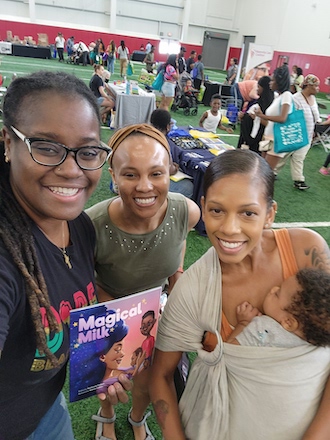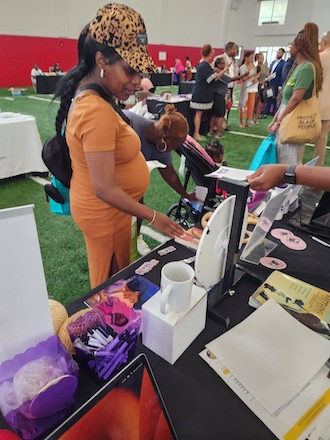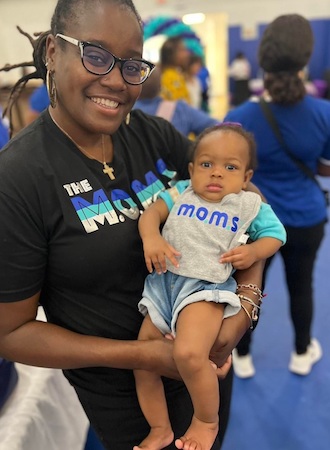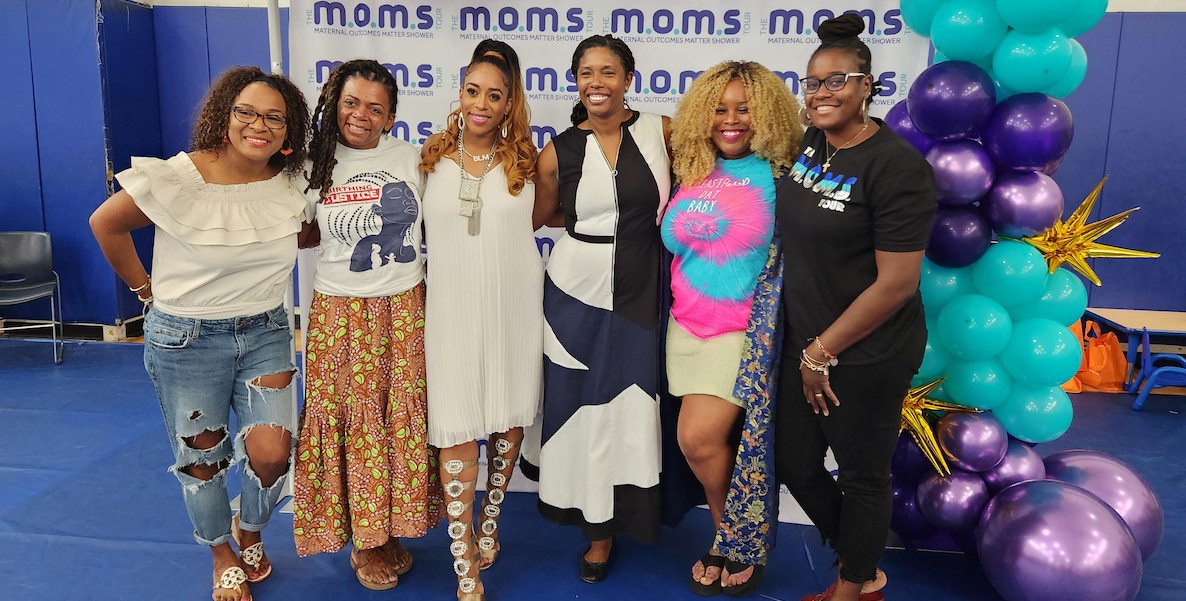In 2011, Alexia Omega Doumbouya had just given birth to a beautiful, healthy, happy baby girl. So she couldn’t figure out why she was struggling to connect to her daughter. Or why she didn’t feel like eating. Why she was having intrusive thoughts and why, on some days, those thoughts made her question the point of living at all.
“I had this baby, and six weeks later I was expected to go back to work. And I just kept thinking How am I supposed to do this?” Doumbouya recalls. She soldiered on through those early years, never quite having the language for what she’d experienced: severe postpartum depression, psychosis and anxiety.
But she noticed a pattern: As her daughter got older and she had distance from those early years, she’d open up to other women about what she had gone through, and they’d share their own struggles — with fertility and pregnancy, delivery, postpartum and loss. Doumbouya herself had been born premature, creating a set of challenges for her own mother decades earlier.
She knew there were supports out there — but they all just seemed so hard to access. As a Black and then-single mother, the resources she had known of didn’t connect to her or, for that matter, many of the women she knew.
Black motherhood
Just being a Black mother-to-be put Doumbouya and many of her friends at risk. According to the Centers for Disease Control and Prevention (CDC), Black women are three times more likely to die from a pregnancy-related cause than White women, largely due to the kind of structural racism that’s been baked into our healthcare system for as long as modern healthcare has been around.
Black and Brown folks were for centuries denied access to high-quality healthcare or high-level careers in the medical field, creating barriers in care and communication. Take, for example, the fact that Black women are twice as likely as White women to die of maternal sepsis. There is nothing biologically different happening in Black and White mothers when the condition occurs; rather, according to many studies like the 2022 Clinicians’ Perspectives on Racism and Black Women’s Maternal Health, it’s the likelihood that White mothers’ concerns are more likely to be taken seriously and addressed that creates the divide.
“We’re dealing with some issues that come down to a lack of awareness and attention to what will help improve outcomes for Black and Brown communities, which ultimately will improve this city for everyone.” — Alexia Omega Doumbouya
As the U.S. House of Representatives’ Black Maternal Health Caucus noted in a report, Racial/Ethnic Disparities in Pregnancy-Related Deaths — United States, 2007–2016, “even a Black woman with a college degree is more likely to die from giving birth than a White woman without a high school diploma.”
And Philadelphia has the highest infant mortality rate among the country’s 10 largest cities — with Black babies, and their mothers, at greatest risk of poor birth outcomes.
“What I realized was that we need community,” Doumbouya says. “We needed easier access to the resources that do exist.”

Doulas to the rescue
In 2017 and 2018, she did doula training through her church, Enon Tabernacle Baptist. And in 2019, bolstered by feedback from friends and family, Doumbouya launched Cocolife.Black — first as a meetup group for new moms, then gradually expanding to be a full-service, nonprofit platform to serve women in three key stages: pregnancy, postpartum, and the loss of a child or significant loved one. The organization offers free doulas, free mental health counseling, and access to grief support for the loss of a child or loved one, through a partnership with another local nonprofit, Beauty Over Ashes and Royal Generation.
Doulas make sure mothers are comfortable, informed and able to advocate for themselves. Unlike midwives, who are licensed to provide medical care, doulas provide emotional support and information, everything from helping parents set up their home for the arrival of their baby to holding a mother’s hand during delivery. Some provide full-scope care from preconception through postpartum; others specialize in one stage of the birth experience. Doula care has been shown to have myriad positive outcomes, from reducing prematurity, improving maternal mental health, improving breastfeeding success, and more.
“A lot of women don’t know about doulas or, if they do, they don’t feel like they can afford it. They think it’s a luxury.” — Ariel Julian
In 2023 alone, Cocolife.Black has reached more than 2,400 women, partners, and children, through their doulas, doula training, grief counseling, mental health support, and community events — like showers for baby, mom, and partners. This year they’ve trained 60 doulas and will offer 80 additional doula training scholarships through the remainder of 2023. They’ve traveled as far as Alaska and Louisiana with The M.O.M.s (Maternal Outcomes Matter) Tour, bringing baby showers and educational panels on maternal mental health to communities around the country, in partnership with A Chance to Learn.

Cocolife.Black will host another community shower on November 11 at Enon Tabernacle Baptist Church’s annual Know Your Numbers event. On December 28, they’ll host a “purple carpet” fundraiser — a private viewing of The Color Purple to raise funds for programming.
“Every woman deserves one.”
Funding for the services Cocolife.Black provides comes through various channels. Many doulas and mental health providers offer their services free of charge; some clients opt for a buy-one-get-one approach to their own care — paying for the services of a doula or mental healthcare provider, and covering the cost for another woman to have the same benefit. And there are nonprofit and corporate donors, which have included IBX, Enon Tabernacle Baptist Church, Penn Medicine Obstetrics & Gynecology, LabCorp, Einstein Healthcare Network, Family Practice and Counseling Network. (Full disclosure: IBX is also a sponsor of The Citizen.)
Doumbouya, who juggles her Cocolife.Black work with her career as a workshop facilitator and curriculum developer, regularly offers her services free of charge.
Ariel Julian, a mom of three, says that Cocolife.Black has been an integral part of her family. “A lot of women don’t know about doulas or, if they do, they don’t feel like they can afford it. They think it’s a luxury,” Julian says. “But every woman deserves one.”
“I decided to become what I did not have at the time.” — Ariel Julian
Before modern times, she adds, women’s lives used to revolve around childbearing. “Everybody would kind of stop and drop everything they were doing to make sure she was comfortable, to make sure that she had the support, to make sure that the pregnancy survived and that mom and baby survived. We’ve lost that model as women have been fully in the workforce.” That’s what the doula is for, she says, to give that dedicated support to the mom that she deserves. To provide that village.
Now a doula herself, she’s giving back to the Cocolife.Black community that uplifted her by training new doulas.

Doumbouya has seen so many women like Julian drawn to the work of Cocolife.Black for the same reason she created it: “I decided to become what I did not have at the time,” she says.
Her goal is to become the household name in maternal care in Philadelphia. She’s been called on by nearly all of Philly’s major hospital systems, who’ve sent her clients and partnered on events. Cocolife works closely with dad organizations, and with grief counselors. And that spirit of collaboration, she believes, will be critical to changing the race-based disparities in maternal healthcare.
“The best thing we can do is create an ecosystem, and come together. My charge is: Let’s not overcomplicate this,” she says. “We are dealing with some real issues, some race-related issues. But we’re also dealing with some issues that come down to a lack of awareness and attention to what will help improve outcomes for Black and Brown communities, which ultimately will improve this city for everyone. We have to become more compassionate, we have to become more emotionally and physiologically invested, and we have to work together.”
This piece is part of a year-long editorial series looking at innovations to address inequities in women’s healthcare, sponsored by Independence Blue Cross.
![]()
![]()
READ MORE ABOUT MATERNAL HEALTH IN PHILADELPHIA



